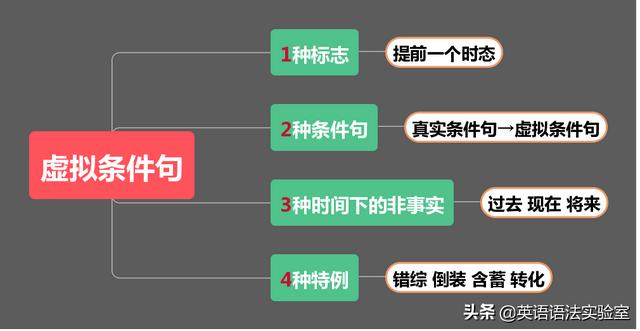
英语中有三种语气:
1. 陈述语气
表示动作或状态是现实的、确定的或符合事实的,用于陈述句、疑问句和某些感叹句。
There are two sides to every question.
2. 祈使语气
表示说话人对对方的请求或命令。
Please lend me your dictionary.
3. 虚拟语气
用来表示所说的不是事实, 或者是不可能发生的情况, 而是一种假设、 愿望或建议等。 虚拟语气通过谓语动词的特殊形式来表示。
If I were a bird, I could fly in the air.

(一) 虚拟语气之非真实条件句
1)基本用法
与现在事实相反,从句谓语动词用were,主句谓语动词用
should/would/could/might 动词原形;
与过去事实相反,从句谓语动词用had done,主句谓语动词
should/would/could/might have done;
与将来事实相反,从句谓语动词用were/were to do/should 动词原形,主句谓语动词
用should/would/could/might 动词原形

2) 错综时间条件句
有时非真实条件句的动作和主句的动作不同时发生,或主从句的动作有一个是事实, 这种情况下谓语动词要根据各自的具体情况来确定。 如:
If he had worked hard at his lesson, he would be in college now.
如果他努力学习,现在已经考上大学了。
3) if 在条件句中的省略
如果非真实条件句中有 had, were, should, 可省略 if, 而将 had, were, should 提前形成部分倒装。 如:
Had he taken my advice, he would not have made such a mistake.
如果他听取我的建议的话,他就不会犯这种错了。
Should it be sunny tomorrow, we would go hiking.
如果明天晴天,我们会去徒步旅行。
Were there no air or water, there would be no living things on the earth.
如果没有空气和水,地球上也不会有生命。
4) 含蓄条件句
有时非真实条件不是通过 if 引导的条件来表现的,而是通过一些词或短语来表示, 如 without, but for, otherwise, but 等。 如:
I couldn't have finished the work on time without your help.
如果没有你的帮助, 我无法按时完成这项工作。
But for your timely warning, we would have got into great trouble.
如果没有你及时的提醒,我们已陷入大麻烦里。

(二) 名词性从句中的虚拟语气
1. wish 后面的宾语从句一般用虚拟语气,表示一种不可能实现的愿望。
与现在事实相反,从句用一般过去时
与过去事实相反,从句用过去完成时
与将来事实相反,从句用 would/could+动词原形
I wish (that) I were a bird and could fly freely in the sky.
我希望我是一只小鸟, 能在天空自由飞翔。
How I wish you had joined us in singing the song!
我多么希望你加入我们一起唱歌。
I wish you could accompany me to Shanghai next week.
我希望你下周陪我去上海。

2. 在 would rather/prefer 后的宾语从句中。 其宾语从句的谓语动词用一般过去时。 (be 用 were)表示对现在或将来的虚拟, 宾语从句谓语动词用过去完成时表示对过去的虚拟。 如:
I would rather they didn't hear of the news.
我宁愿他们没听到那个消息。(对现在的虚拟)
I would rather/prefer I had not told him the bad news.
我宁愿没告诉他那个坏消息。(对过去的虚拟)
3. 用于表示建议、愿望、命令等动词后的宾语从句中。常见的动词:
这些动词后的宾语从句中的虚拟语气结构为“(should )动词原形”。
如:He recommended that the task should be finished tomorrow.
他建议明天一定把任务完成。
注意:
当 insist 表示“坚持认为;坚持说“;suggest 表示“暗示,表明”时后面的宾语从句不用虚拟语气。
The young man insisted that he did nothing wrong and should be set free at once.
这个年轻人坚持认为他没有做错,坚决要求马上被释放。
The girl's pale face suggested that she was ill and I suggested that she go to see the doctor at once.
这个女孩苍白的脸色表明她病了,我建议她马上去看医生。
Teachers recommend parents not allow their children under 12 to ride bicycles to school for safety.
老师们建议父母,为了安全不要让他们 12 岁以下的孩子骑车上学。

4. 虚拟语气在同位语从句和表语从句中的运用。 一些表示“建议、 要求、命令”等的名词advice, idea, order, demand, plan, proposal, suggestion, request等单词, 其后所接的表语从句和同位语从句的谓语动词用“(should)+动词原形”。
My suggestion is that we (should) get started as soon as possible.
My advice is that you (should) quit smoking.
5. 常用虚拟语气(谓语动词用 should do, 其中 should 可以省略) 的主语从句有以下三个句式:
如:
It is very important that we(should)master the basic skills of computer.
It is a rule that everyone(should)obey the law of the country.
It is suggested we(should)start before sunset.

(三) 其他句型中的虚拟语气
1. 虚拟语气在 as if/as though 引导的从句中的运用
如果 as if/as though 引导的从句谓语动词所表达的动作与主句谓语动词所表达的动作同时发生, as if/as though 引导的从句谓语动词用一般过去时;
如果 as if/as though 引导的从句谓语动词所表达的动作先于主句谓语动词所表达的动作,as if/as though 引导的从句谓语动词用过去完成时;
如果 as if/as though 引导的从句谓语动词所表达的动作后于主句谓语动词所表达的动作,as if/as though 引导的从句谓语动词用过去将来时。 如:
He looks as if he were an artist.(同时)
他看起来像个艺术家。
She speaks English so fluently as if she had studied English in America.(先于)
她讲英语如此流利,好像她在美国学过英语一样。
He learns English so hard as if he would go to the U.S.A.(后于)
他如此努力地学英语,好像他要去美国一样。
2. It is (high) time(that)...句型中
该句中,定语从句的谓语动词用一般过去时,也可以用 should 动词原形,但是 should 不能省略。 此句型意为”(现在)该……“用来表示提议。 如:
It is (high) time that you went to school.
你该去上学了。
3. even if 从句中的虚拟语气
在 even if/even though 引导的让步状语从句中, 表示与所发生的事实相反时,应采用虚拟语气, 其让步状语从句中虚拟语气的构成形式与条件句中虚拟语气的构成形式相同。 如:
Nothing could have saved him even if he had been tended without delay.
什么都挽救不了他,即使他的看护没有被延误。
4. 在其他状语从句中的虚拟语气
在 in case, lest, for fear that 引导的状语从句中的虚拟语气, 表示“以防,以免从句谓语动词常为“should 动词原形”。 如:
He took his raincoat with him in case it should rain.
他带着雨衣以防下雨。

用于 if only 引导的感叹句中
If only 句子=How I wish that 从句(that 可省略). 如:
If only I were a flying bird! = How I wish I were a flying bird!
我要是一只飞鸟该多好啊!
If only I had seen the film!=How I wish I had seen the film!
我要是看了那部电影该多好啊!






